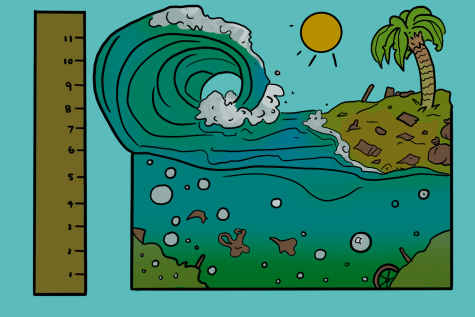Editorial: The Lorax speaks for the trees, but who speaks for climate change coverage?
September 17, 2020

Tropical storms Sally and Vicky became the earliest S- and V-named storms on record this September. This occurrence is just another natural disaster amplified by human-made climate change and it needs to stop.
This hurricane season and the wildfires ravaging the West Coast have been fanned by an unnatural rise in temperature. When air and water temperatures rise, they cause precipitation to shift which can make already heavy downpours heavier and arid areas drier, causing increased flooding and kindling, according to the U.S. government’s National Climate Assessment.
So if climate change is the root cause of these deadly disasters, why is it not on the front page of every newspaper and magazine, or the first phrase out of broadcasters’ mouths? Its effects cause global inequities and nearly 150,000 deaths annually, according to the World Health Organization—so how are stories on this issue not on the top of every editor’s to-publish list? The answer might just be because 2020 has brought us a handful of similarly pressing matters.
The coronavirus pandemic is raging on, having already killed nearly 1 million people worldwide. And with protests against police brutality still flooding U.S. streets, there always seem to be more timely headlines and more compelling photos dominating news coverage.
But climate change has been present for a long time, and it is not going away any time soon. Because it is so engraved in our daily lives, it does not seem timely enough to make the news unless there is a major event connected to it—like a destructive hurricane season and an entire coast on fire.
But the “not going away” part is crucial because we will be living with the effects into the next century.
A collection of data garnered from researcher evidence shows that between now and 2100 the Earth’s temperature could rise nearly 6 degrees Fahrenheit, after having already risen approximately 2 degrees in the last 30 years, according to Global Climate Change Explorer
Imagine, then, what heavier storms and drier areas will look like in the next 80 years.
But hope is not lost. Using biodegradable elbow grease, the Chronicle discussed original ways we would like to see climate change covered by other news organizations and ourselves:
—Make it about us. We want to know how each corner of the world, especially our own, is being affected. Why should anyone care about climate change if it doesn’t affect them, right?
—Stop politicizing it and give us the facts. Hearing political figureheads talk about climate change is great, but sometimes all we need is an easy-to-understand fact sheet.
—Talk about someone other than the white, middle-class third-grade teacher who taught their students to recycle. How is climate change affected by racial and class inequality?
—Hello! We need solutions journalism. Do not tell us we are going to die in 80 years without giving us a call to action. How can we help? How can we go beyond asking consumers to take action and pressure corporations to take action? According to the 2017 Carbon Majors Report, 71% of greenhouse gas emissions are caused by 100 corporations. We can all make the switch from plastic straws to metal ones, but it is not going to matter if corporations don’t start to make changes now. Our call to action is to hold each and every corporation accountable for their emissions and impact on the planet.
The environment’s health is more important now than ever before because of its direct ties to the coronavirus, or COVID-19.
People are more likely to die from the coronavirus in areas that have poor air quality regardless of their pre-existing health conditions or class status, according to the Harvard T.H. Chan School of Public Health.
People with heart conditions are particularly vulnerable to the coronavirus, so by using low-carbon energy sources, we can lessen air pollutants that can lead to heart attacks and strokes.
While climate change is not always a hot button topic, it is always lurking under other issues. Keeping it in the minds of the public is how journalists can help save the world from becoming drenched and scorched.






